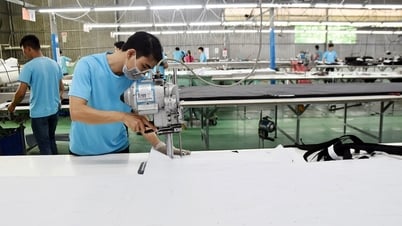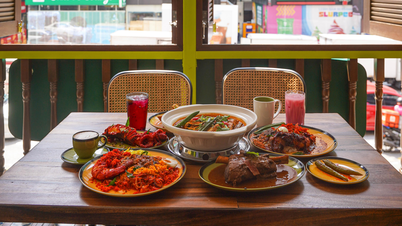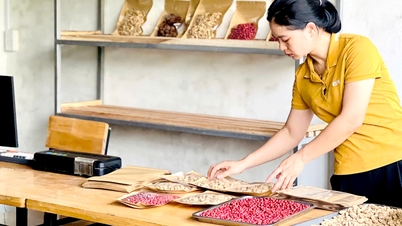Medical news September 17: Streptococcal infection due to the habit of eating raw and undercooked food
Despite many warnings, recently, hospitals in the capital have been treating cases of streptococcus suis infection.
Streptococcus suis infection due to the habit of eating raw and undercooked food
Most cases of infection are related to slaughtering, eating raw blood pudding or foods made from undercooked pork.
According to a report from the Hanoi Center for Disease Control (CDC), the city has just recorded 1 case of streptococcus suis infection. Thus, from the beginning of 2024 until now, Hanoi has had 8 cases of streptococcus suis, of which 1 case died. The newly recorded case is a male patient (34 years old, in Hoan Kiem district).
 |
| Illustration photo. |
This patient started to have symptoms of high fever, headache, impaired consciousness, drowsiness, and urinary incontinence on August 29. The patient was then taken to Bach Mai Hospital for treatment by his family.
The patient's cerebrospinal fluid test results on September 5 showed that he was positive for Streptococcus suis. Currently, the patient's health is stable.
Not as lucky as the above case, after eating blood pudding for luck, the male patient (27 years old, in Bac Ninh province) showed signs of fatigue, body aches, chills and fever. The next morning, his family discovered the patient in a coma, unresponsive to calls, and cyanotic all over.
The patient was intubated and placed on a ventilator and transferred from Bac Ninh General Hospital to the National Hospital for Tropical Diseases.
Here, the patient developed a necrotizing hemorrhagic rash scattered all over the body, concentrated in many areas of the face and extremities. Test results and diagnosis showed that the male patient had septicemia - meningitis caused by Streptococcus suis. At the hospital, the patient was treated for complications of multiple organ failure, severe blood clotting disorder, continuous blood filtration, and transfusion of blood products...
Streptococcus suis (S. suis) is a zoonotic disease that can be fatal.
It is worth mentioning that patients often have severe clinical symptoms, require long-term treatment, high treatment costs, and often leave irreversible complications after recovery.
Doctor Phan Van Manh, Emergency Department, Central Hospital for Tropical Diseases added that streptococcus suis disease usually causes two main clinical conditions: bacteremia and meningitis.
The disease can occur in any healthy subject. However, studies show that the disease may be more common in patients with alcohol abuse. In particular, in patients with immunodeficiency, many underlying diseases, and old age, the disease progresses more severely.
Therefore, according to doctors' recommendations, to prevent the risk of infection, people should choose to buy pork that has been inspected by veterinary agencies, has a clear origin, and avoid buying meat with unusual red color, bleeding or edema. On the other hand, do not slaughter or eat sick pork of unknown origin.
Streptococcus suis bacteria can be completely destroyed when food is thoroughly cooked. Therefore, people should strictly follow the rules of eating cooked food and drinking boiled water, not eating dead pork, not eating rare or raw dishes, especially pig blood pudding and blood puddings of goats, geese, and ducks. When symptoms of the disease appear, it is necessary to go to a medical facility immediately for timely detection and treatment.
According to the Hanoi CDC, streptococcal disease transmitted from sick pigs to humans includes three forms: sepsis, purulent meningitis, or a combination of both.
Depending on the type, the disease can progress to be mild or severe. Some cases are even severe from the start. Therefore, eating dishes made from undercooked pork, such as blood pudding, sour sausage, etc., can easily lead to the risk of contracting the disease.
Even contact with sick or dead pigs can cause the slaughterer to be infected with streptococcus suis through skin lesions and scratches. Currently, there is no vaccine to prevent the disease. Therefore, compliance with food cooked thoroughly, boiled water and safety regulations when slaughtering is extremely important.
The Ministry of Health recommends eating cooked food and drinking boiled water to prevent food poisoning.
Since the beginning of 2024, the country has recorded many large-scale food poisoning cases. Typically, 153 people in Soc Trang were poisoned after eating bread, pate, and spring rolls in March. Authorities determined the cause of Salmonella infection in cold cuts eaten with bread.
Also in March this year, 368 people were hospitalized after eating chicken rice at a restaurant in Nha Trang, Khanh Hoa. Experts determined the cause of the poisoning was Salmonella bacteria in chicken meat.
In late April and early May, more than 550 people in Long Khanh, Dong Nai were hospitalized after eating bread at an unlicensed business in the area. The cause of the poisoning was Salmonella bacteria and some other bacteria in pork and pate eaten with bread.
By May 2024, 438 workers in Vinh Phuc had to be hospitalized after eating at the company's communal kitchen. The cause of the poisoning was determined to be a rare type of aerobic bacteria, suspected to be present in the sour soup.
In August 2024, 150 workers at Hoang Xa Industrial Park, Phu Tho had to be hospitalized after eating a meal. The cause of this was due to high levels of histamine (3,806 mg/kg) in the braised fish dish during the meal.
Through the above food poisoning cases, Dr. Nguyen Trung Nguyen, Director of the Poison Control Center, Bach Mai Hospital (Hanoi), said that the above incidents were all caused by microorganisms, causing acute poisoning, with a lower mortality rate than chemical and toxic poisoning. If the cause was chemicals, the mortality rate would be much higher.
Poisoning incidents involving hundreds of people tend to increase, Dr. Nguyen said, due to two factors.
Firstly, the objective factor is the weather and climate of our country, which is hot, causing bacteria and germs to grow and develop. In addition, Vietnam is in the trend of open development, people are shifting their meals from family to the community, such as breakfast at restaurants, meals at boarding schools, and collective kitchens.
Second, the subjective factor is the responsibility of the production facility and management agency.
Mr. Do Xuan Tuyen, Deputy Minister of Health, said that currently, according to the Law on Food Safety and Decree 15 of the Government, there are 3 agencies responsible for food safety issues including the Ministry of Industry and Trade, the Ministry of Health, and the Ministry of Agriculture and Rural Development.
Mr. Tuyen said that to do a good job in food safety, it is necessary to implement the Food Safety Law well and ensure propaganda work to raise awareness from authorities at all levels about the role of supervision. Propaganda for people to ensure health for themselves and the community.
In recent times, poisoning cases have been related to communal kitchens and street food, so localities must strengthen inspection and supervision of these areas. According to Mr. Tuyen, it is necessary to closely inspect and supervise the area from the stages of farming, harvesting, processing and use.
When there is participation from all levels, sectors and fields such as farming by the agricultural sector, market circulation by the industry and trade sector, inspection before use, production and processing facilities by the health agency, food poisoning will certainly decrease.
The Deputy Minister of Health also emphasized that everyone should eat cooked food and drink boiled water, not buy food of unknown origin, and not use street food that does not ensure food hygiene and safety.
According to the Ministry of Health's report, in the first 6 months of 2024, the country recorded 55 cases of food poisoning, 6 deaths, and 2,397 hospitalizations.
The cause of food poisoning can occur in one of many stages, from selecting ingredients, preparing, processing, preserving, and selling food to consumers.
Fournier syndrome due to self-medication with tobacco
By applying tobacco to treat his illness on his own, patient GXS, a 59-year-old male, Mong ethnic group, living in Ha Giang, experienced serious complications of Fournier syndrome (necrosis of the genital and anal areas).
Through medical history, the patient said that 13 days before being admitted to the hospital, he had symptoms of swelling, heat, redness and pain in the scrotum. Trusting in traditional treatment methods, the patient sought out a local herbalist for examination and applied herbal medicine at home.
However, after applying this method, the patient's condition not only did not improve but also became more severe, with necrosis of the entire perineal scrotal skin spreading to the abdominal wall.
The patient was admitted to the hospital with the following symptoms: fever, necrotic perineum and abdominal wall, foul odor, pus and pseudomembrane, and severe pain. After 2 days of treatment at the primary health care facility without improvement, the patient was transferred to the Central Hospital for Tropical Diseases.
The patient was immediately admitted to the Intensive Care Unit. The patient was diagnosed with Fournier syndrome, and was monitored for sepsis with obvious symptoms: the scrotal area had a lot of pus necrosis and spread to the abdominal wall. This syndrome is a condition of soft tissue necrosis in the genital and anal areas, a very dangerous complication that can lead to death.
Master, Doctor Ha Viet Huy, Department of Intensive Care, said that the genital and anal areas are areas with very few blood vessels, so medical treatment is often ineffective. In this case, only surgery can save the patient's life.
The patient was then transferred to the Department of General Surgery - Urology and Andrology for surgery. According to Dr. Tran Thuong Viet - Head of the Department, who directly performed the surgery on the patient, the doctors removed the entire scrotum, the necrotic perineum and the necrotic abdominal wall. However, the necrosis can still progress and it is possible that the patient will have to undergo one or several more surgeries.
After surgery to remove the necrotic lesion, the patient was transferred back to the Intensive Care Unit for continued treatment.
According to Dr. Huy, Fournier syndrome is common in patients with weakened immune systems. If not detected and treated promptly, the disease can lead to dangerous complications such as blood loss, septic shock, and a very high risk of death.
In this case, the patient's self-treatment with unknown ingredients created ideal conditions for bacteria to grow, causing the disease to progress rapidly and become more complicated.
Dr. Huy also emphasized that if the patient had been treated properly and promptly from the beginning, the necrosis might not have developed to such a serious level.
Fournier syndrome, although rare, can be completely cured if detected early and treated promptly. Patients and the community should avoid self-treatment by word of mouth methods, especially the use of tobacco or folk remedies of unknown origin.
When there are unusual symptoms such as swelling, heat, redness, pain in the genital or anal area, patients need to quickly go to reputable medical facilities for timely examination and treatment.








































































































Comment (0)